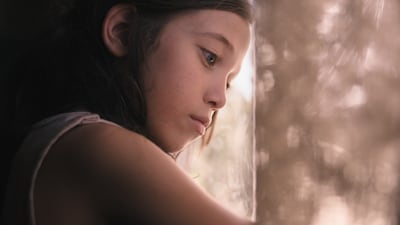In late 2015, ISIS banned televisions across its territories, denouncing the medium as an instrument for corrupting people’s minds and spurring dissent.
The ban was by no means extraordinary. By then, the militant group had already become notorious for their draconian rules, having outlawed music, shaving, private internet access and secular schooling.
Yet, news of the TV ban made a lasting impression on Jordanian filmmaker Murad Abu Eisheh, and serves as the basis for his Oscar-shortlisted film Tala’vision.
The feature is about 30 minutes long and tells the story of Tala, 8, whose only refuge from her war-ravaged reality is her secret television.
“News of the ban stayed with me for a long, long time,” Abu Eisheh tells The National. “I started reflecting on my life because, as a child, I was really attached to our television set. TV played a major role in my life. My parents, at some point, were worried because all the children would play outside, and I would be stuck to this TV screen, watching film after film.”
The filmmaker believes for many living in the areas occupied by ISIS, the medium was their sole window to the outside world.
filmmaker
“So after the ban, you had hundreds of children in Iraq and Syria that were completely cut off and had no idea what the outside world looked like.”
While the ban lay the foundation for the plot of Tala’vision, it was an encounter along the Jordanian-Syrian border in 2015 that inspired the film’s young protagonist. Murad had been working as a videographer for the Jordanian Armed Forces when he saw a little girl crossing the border alone.
“She was an orphan,” he says. “About 8 years old and she had her suitcase on top of her head. Her face really stayed with me. I kept wondering what could be this little girl’s story and why she was alone.”
Abu Eisheh had the girl in mind as the team began casting for the part of Tala in early 2019.
“We wanted to find a little girl with a Syrian background, but we really didn’t know what we were looking for,” the filmmaker explains. “We must have seen around 200 girls in three months. With each, we sat down and did exercises and talked to them, trying to understand their personalities, and how they reacted to certain questions and exercises.
“With Ayesha Balasem, the moment she walked into the room, she captivated us. She was completely different than the other children. We then did a camera test and she was breathtaking.”

After casting Ayesha, Abu Eisheh began spending time with her and her family to learn more about their experience as refugees and earn their trust.
“The more I got to know her, the more I realised she was traumatised, that her family is traumatised,” he says. “I spoke to child actor therapists and trauma psychiatrists, it was a priority for the production. We had to make sure we weren’t damaging her more with what we’re doing and actually help her and her family. They were so traumatised that when I read the script to Ayesha’s father for the first time, he started crying. It was a very shocking moment to see that he himself was traumatised as well. He then shared with me their story, which was shockingly similar to the film.”
While Ayesha’s participation in the film did bring up difficult memories for the Balasems, Abu Eisheh says it was also somewhat therapeutic for the family to talk about their experiences crossing ISIS-ruled territories while escaping to Jordan.
"It was emotional for them. At the same time, I think it was helpful because it was probably the first time they were able to talk about it out loud with someone else.”
Working on the film was also a transformational experience for Ayesha herself, who the filmmaker says had never seen women occupying leading positions.
“It was the first time she saw women in leading roles, behind the camera, bossing around guys,” he says. “Her self confidence was so boosted. After the shoot, I remember her father coming up to me and saying she’s a different person.”
Tala’vision has already raked in a dozen awards from several global festivals, including the Golden Yusr in the shorts category at the Red Sea International Film Festival last December. It also won the prize for best narrative film at the Student Academy Awards in October, which made it eligible to compete in the Oscars in the live action short film category.
Though it remains to be seen whether the film will stay in the running for the Oscars when the nominations are announced on February 8, Abu Eisheh says he is still trying to take in the film’s accomplishments .
“It’s been out of this world. When I found out we’d been nominated for the Student Academy Awards, I was in my apartment and started crying,” says the filmmaker, who lives in Germany. “And then when we won the Student Oscar, and it was the first Arabic film to win in a fiction category, it was absolutely mad. I was speechless.
“When we found out we had made it to the shortlist for the Oscars, I was with most of the team in a restaurant in Germany and we started screaming. Some people freaked out,” he says. “This campaign for the Oscars no one prepares you for. We’re excited."


